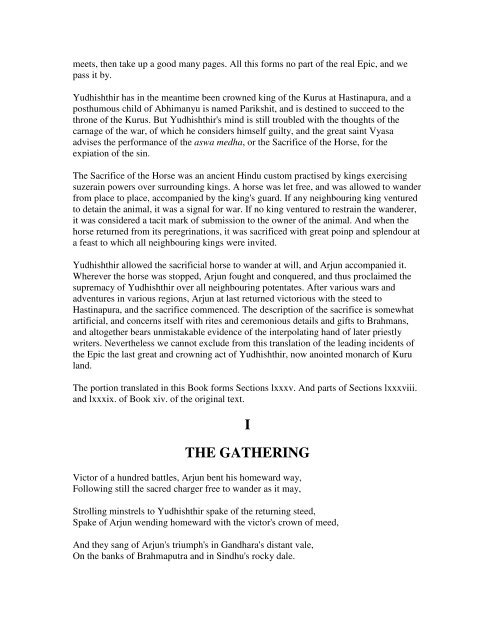MAHABHARATA CONDENSED INTO ENGLISH ... - Mandhata Global
MAHABHARATA CONDENSED INTO ENGLISH ... - Mandhata Global
MAHABHARATA CONDENSED INTO ENGLISH ... - Mandhata Global
Create successful ePaper yourself
Turn your PDF publications into a flip-book with our unique Google optimized e-Paper software.
meets, then take up a good many pages. All this forms no part of the real Epic, and we<br />
pass it by.<br />
Yudhishthir has in the meantime been crowned king of the Kurus at Hastinapura, and a<br />
posthumous child of Abhimanyu is named Parikshit, and is destined to succeed to the<br />
throne of the Kurus. But Yudhishthir's mind is still troubled with the thoughts of the<br />
carnage of the war, of which he considers himself guilty, and the great saint Vyasa<br />
advises the performance of the aswa medha, or the Sacrifice of the Horse, for the<br />
expiation of the sin.<br />
The Sacrifice of the Horse was an ancient Hindu custom practised by kings exercising<br />
suzerain powers over surrounding kings. A horse was let free, and was allowed to wander<br />
from place to place, accompanied by the king's guard. If any neighbouring king ventured<br />
to detain the animal, it was a signal for war. If no king ventured to restrain the wanderer,<br />
it was considered a tacit mark of submission to the owner of the animal. And when the<br />
horse returned from its peregrinations, it was sacrificed with great poinp and splendour at<br />
a feast to which all neighbouring kings were invited.<br />
Yudhishthir allowed the sacrificial horse to wander at will, and Arjun accompanied it.<br />
Wherever the horse was stopped, Arjun fought and conquered, and thus proclaimed the<br />
supremacy of Yudhishthir over all neighbouring potentates. After various wars and<br />
adventures in various regions, Arjun at last returned victorious with the steed to<br />
Hastinapura, and the sacrifice commenced. The description of the sacrifice is somewhat<br />
artificial, and concerns itself with rites and ceremonious details and gifts to Brahmans,<br />
and altogether bears unmistakable evidence of the interpolating hand of later priestly<br />
writers. Nevertheless we cannot exclude from this translation of the leading incidents of<br />
the Epic the last great and crowning act of Yudhishthir, now anointed monarch of Kuru<br />
land.<br />
The portion translated in this Book forms Sections lxxxv. And parts of Sections lxxxviii.<br />
and lxxxix. of Book xiv. of the original text.<br />
I<br />
THE GATHERING<br />
Victor of a hundred battles, Arjun bent his homeward way,<br />
Following still the sacred charger free to wander as it may,<br />
Strolling minstrels to Yudhishthir spake of the returning steed,<br />
Spake of Arjun wending homeward with the victor's crown of meed,<br />
And they sang of Arjun's triumph's in Gandhara's distant vale,<br />
On the banks of Brahmaputra and in Sindhu's rocky dale.
















